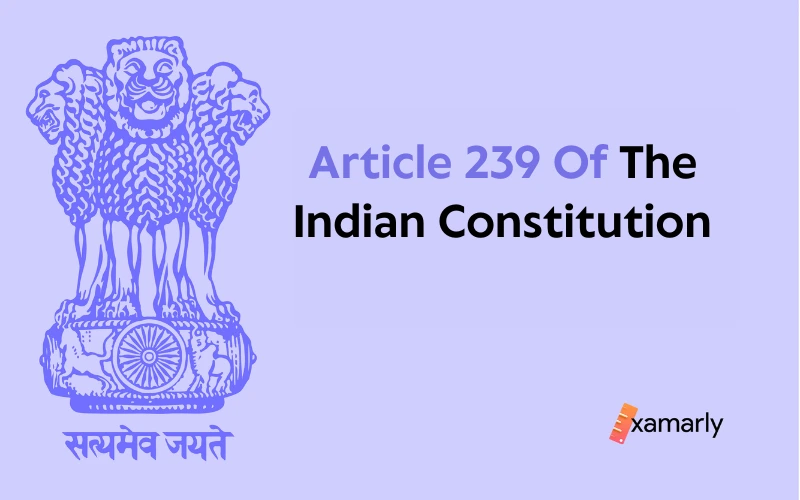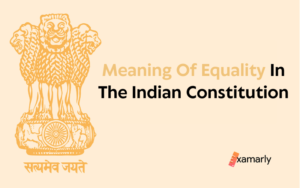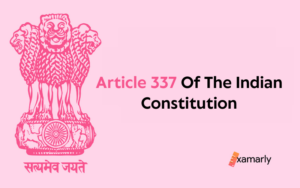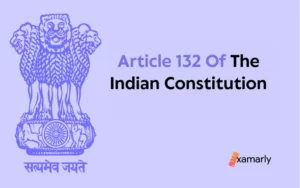The portion of Article 239 of the Indian Constitution that pertains to the governance of Union Territories like Delhi is going to be the focus of our attention here. It is crucial to understand what the Union Territories are before getting started with their administration.
The Union Territories, which were previously included under the First Schedule as part C and part D respectively, were moved to the second part of the First Schedule to make room for Union territories. The 7th Amendment Act of 1956 enacted this change.
The creation of the Union Territories was necessary to protect the rights of indigenous cultures and to prevent political unrest over issues of government, among other things. In light of these considerations, an Indian sub-jurisdiction can be granted the status of “Union Territory.”
Part VII of the Constitution contains Article 239. This page covers the provisions of Articles 239, 239A, 239AA, 239AB, and 239B.
- Article 239 Of The Indian Constitution: Administration Of Union Territories
- Article 239A
- Article 239AA: Special Provisions With Respect To Delhi
- Article 239AB: Provisions For When The Constitutional Machinery Fails
- Article 239B
- Winding Up
- FAQs
- Which Amendment Has Inserted Article 239AA And Article 239AB?
- What Article 239AA Of The Indian Constitution Entails?
- What Article 239AB Of The Indian Constitution Entails?
- What Is Constitutional Machinery?
- What Are Ordinance And Promulgation?
- What Is Article 368?
- Who Is Called The Lieutenant Governor?
- Which Article Gives Special Provision To Delhi?
Article 239 Of The Indian Constitution: Administration Of Union Territories
The administration of Union territories is covered under Article 239 of the Indian Constitution. In that sense, the following two provisions are included in this Article:
- Unless specifically stated otherwise by Parliament through the law, each Union territory shall be governed by the President acting in the manner he deems appropriate through an administrator who will be chosen by him and given the title he may specify.
- In spite of anything in Part VI, the President may choose a State’s governor to serve as the administrator of a neighboring Union territory. In such a case, the governor must act independently from his council of ministers in carrying out his administrative duties.
Which Amendment Substituted Article 239?
7th amendment of the Indian Constitution substituted the forenamed Article in Part VII of the Constitution titled ” The Union Territories.”
Article 239A
In accordance with specific Union territories, local legislatures, Councils of Ministers, or both, may be established under Article 239A of the Indian Constitution. In addition to that, the following provisions are mentioned in its two clauses:
(1) The Union Territory of Puducherry may have the following entities established by law:
- (a) an elected body, or one that is partially nominated and partially elected, to serve as the Union territory’s legislature, or
- (b) a Council of Ministers,
or both, each with such constitution, authority, and duties as the law may specify.
(2) For the intents of article 368, any statute referred to in clause (1) shall not be construed to be an amendment of this Constitution, even if it contains provisions that change or have the effect of amending this Constitution.
Why Article 239A Was Inserted To The Indian Constitution?
Article 239A was inserted by the 14th amendment of the Constitution of India. The Bill of 14th amendment aims to give Parliament the requisite legislative authority to enact laws for this objective through the creation of a new article 239A that broadly adheres to the terms of article 240 as it was before the reorganization of the States.
Article 239AA: Special Provisions With Respect To Delhi
Regarding Delhi, special provisions are made in Article 239 AA of the Indian Constitution. Its provisions are as follows:
(1) As of the day that the Constitution (Sixty-ninth Amendment) Act, 1991 went into effect, the name of the Union territory of Delhi will be changed to the National Capital Territory of Delhi (which will be referred to simply as the National Capital Territory for the remainder of this section), and the administrator of that territory who was appointed in accordance with Article 239 was given the title of Lieutenant Governor.
(2) (a) The National Capital Territory shall have a legislative assembly, and its seats shall be filled by representatives elected directly from the territory’s territorial constituencies.
(b) A legislation adopted by Parliament shall regulate the amount of Legislative Assembly seats, the number of seats reserved for the people belonging to Scheduled Castes, the division of the National Capital Territory into territorial constituencies (including the grounds for such division), and all other matters relevant to the operation of the LA.
(c) The provisions covered in articles 324 to 327 and 329 shall be applicable to the NCT, its Legislative Assembly, and its members in the same manner as they do to States, their Legislative Assemblies, and their Members, respectively; and any citation in articles 326 and 329 to the “appropriate Legislature” shall be viewed to be a reference to Parliament.
(3) (a) Subject to the provisions of this Indian Constitution, the LA shall have the authority to enact laws for the entirety or for any portion of the National Capital Territory with regard to any of the matters listed in the State List or in the Concurrent List, insofar as any such matter applies to Union territories, with the exception of matters in relation to Entries 1, 2, and 18 of the State List and Entries 64, 65, and 66 of that List, insofar as they linked to the said Entries 1, 2, and 18.
(b) Nothing in sub-clause (a) shall be construed as derogating from Parliament’s authority under this Constitution to pass legislation relating to any subject for a Union territory or any part thereof.
(c) If any provision of a law created by the Legislative Assembly with regard to a matter is in conflict with any provision of a law crafted by Parliament with regard to that matter, whether passed before or after the law formed by the Legislative Assembly, or of an earlier law, other than a law crafted by the Legislative Assembly, then, in either situation, the law formed by Parliament, or, as the instance may be, such earlier law, shall prevail, and the law made by the Legislative Assembly shall, to the scope of the repugnancy, be void:
With the caveat that any such legislation passed by the Legislative Assembly that has been reserved for the President’s consideration and gained his assent shall take effect in the National Capital Territory:
With the additional caveat that nothing in this sub-clause hinders Parliament from passing a law at any time pertaining to the same subject, including a bill adding to, amending, altering, or repealing the law established by the Legislative Assembly.
(4) There shall be a Council of Ministers, headed by the Chief Minister, composed of not more than 10% of the members of the Legislative Assembly, to assist and advise the Lieutenant Governor in the discharge of his duties in relation to matters over which the Legislative Assembly has the power to enact laws, with the exception of those instances in which he is demanded to act at his or her discretion by or pursuant to any law:
In the event of a disagreement regarding the difference of opinion between the Lieutenant Governor and his Ministers on any issue, the Lieutenant Governor shall refer it to the President for decision and act in accordance with the President’s decision. However, while waiting for the President’s decision, the Lieutenant Governor shall have the authority to act or make a decision if the matter is, in his opinion, so urgent that it requires him to act immediately.
(5) The President is responsible for appointing the Chief Minister, and the President is also responsible for appointing other Ministers at the suggestion of the Chief Minister. The Ministers will hold the chair for the length of the President’s pleasure.
(6) The Legislative Assembly is the body to which the Council of Ministers is collectively responsible.
(7) (a) The Parliament may, by legislation, make provisions for giving effect to or supplementing the provisions included in the preceding clauses, as well as for all matters incidental or consequential thereto.
(b) Regardless of the fact that the law mentioned in sub-clause (a) contains a provision that modifies or has the effect of altering this Constitution, it will not be considered to be a change to the Constitution for the purposes of article 368.
(8) The provisions of article 239B shall, to the extent possible, apply to the National Capital Territory, the Lieutenant Governor, and the Legislative Assembly in the same manner as they do to the Union territory of Puducherry, the administrator, and its Legislature, respectively; and any reference in that article to “clause (1) of article 239A” shall be deemed to be a reference to this article or article 239AB, as the case may be.
Note: Article 239AB was added to the Indian Constitution as part of the 69th amendment in the 42nd year of the Republic of India.
Article 239AB: Provisions For When The Constitutional Machinery Fails
The provisions for when the Constitutional Machinery is unable to function are outlined in Article 239 AB of the Indian Constitution. These provisions are as follows:
In the event that the President, upon receiving a report from the Lieutenant Governor or otherwise is convinced:
(a) that a circumstance has evolved in which the administration of the National Capital Territory cannot be executed in conformity with the provisions contained in article 239AA or of any law adopted in pursuance of that article; or
(b) that doing so is essential or advantageous for the efficient administration of the National Capital Territory
the President may, by order, suspend any provision of article 239AA or the entirety of or any provision of any law passed in accordance with that article for the time period and under the conditions indicated in that law, and he may also make any incidental or consequential provisions that, in his view, are required or expedient for the administration of the National Capital Territory in accordance with articles 239 and 239AA.
Note: Article 239AA was added to the Indian Constitution as part of the 69th amendment in the 42nd year of the Republic of India.
Article 239B
In accordance with Article 239 AA of the Indian Constitution, the administrator may enact ordinances while the legislature is not in session. The provisions of said Article are as follows:
- If at any moment, other than when the Union territory of Puducherry’s Legislature is in session, the administrator of the said territory is satisfied that conditions exist necessitating immediate action, he may promulgate the ordinances that, in his opinion, are essential:
Provided, however, that the administrator shall not issue any such Ordinance unless and until he has first obtained directions to do so from the President in this regard:
Furthermore, the administrator may not issue any Ordinance during the time that the said Legislature is dissolved or its operations are suspended due to any action taken in accordance with any such law as is mentioned in clause(1) of article 239A. - An Ordinance issued under this article in accordance with directions from the President shall be regarded to be an Act of the Union territory’s Legislature that has been duly implemented after complying with the relevant provisions of any such law as is referred to in sub-clause (1) of article 239A. However, each such Ordinance:
- (a) shall be presented to the Union territory’s legislature and shall be discontinued operating six weeks after the reassembly of the legislature or if a resolution disapproving it is approved by the legislature before the expiration of that period, upon the passage of the resolution;
- (b) may revoke any such Ordinance at any moment upon receiving direction to do so from the President.
- To the extent that any provision of an Ordinance made under this Article would be invalid if passed in an Act of the Legislature of the Union territory passed after complying with the provisions in that direction contained in any such law as is referred to in clause (1) of Article 239A, the Ordinance shall be null and void.
Note: 27th Amendment of the Constitution of India inserted Article 239B. 38 Amendment of the constitution inserted the fourth Clause to the aforesaid Article and later 44th Amendment of the constitution deleted that clause from the said Article.
Winding Up
Every Indian citizen is required to abide by the legislation established by the Indian Constitution. The laws are the same everywhere in the country, but in order to account for the unique characteristics of a particular region or territory of India, various laws that regulate such places have been enacted. Article 239 of the Constitution of India addresses topics related to laws similar to these. In a nation where political awareness is growing every day, it is crucial to explain these pieces because they are the talk of the town.
FAQs
Which Amendment Has Inserted Article 239AA And Article 239AB?
Articles 239AA and 239AB of the Constitution were added by the Parliament through the 69th Constitutional Amendment.
What Article 239AA Of The Indian Constitution Entails?
For Delhi, special provisions were made under Article 239AA of the Constitution. The first major change was the renaming of Delhi from “Union Territory of Delhi” to “National Capital Territory of Delhi” (NCT). The “Lieutenant Governor” would serve as the NCT’s administrator (LG). According to Article 239AA, the NCT has a legislative assembly with the authority to enact legislation on topics included in the State List and Concurrent List of the Constitution, to the extent that these lists apply to Union Territories.
What Article 239AB Of The Indian Constitution Entails?
In the event that the constitutional machinery was unable to function properly, the provisions outlined in Article 239AB would be put into effect. The President may issue an order suspending the implementation of any provisions of Article 239AA or laws passed under it if, after receiving a report from the LG, they determine that the administration of the NCT cannot be conducted in accordance with its requirements.
What Is Constitutional Machinery?
The term “constitutional machinery” refers to a body of elected officials or the government of a certain territory who are/is obligated to handle the affairs of that specific Indian territory in accordance with the provisions of the constitution of that particular land. Nevertheless, in the event that the constitutional machinery fails to function properly as a result of particular circumstances, the President is required to take action.
What Are Ordinance And Promulgation?
An ordinance is legislation that can be passed by a city, a commission, or a nation for reasons not covered by federal or state laws. Safety and building regulations are a couple of examples. On the other hand, to promulgate implies putting into effect a law (or an ordinance in this context) by means of an official proclamation.
What Is Article 368?
Article 368 outlines the process for modifying the Constitution.
Who Is Called The Lieutenant Governor?
The Republic of India has eight union territories in total, and the lieutenant governor serves as the constitutional head of five of them. The Indian President appoints the lieutenant governor, who serves at the President’s pleasure and is in office for a period of five years.
Which Article Gives Special Provision To Delhi?
The Indian Constitution contains special provisions relating to Delhi in Article 239 AA. Eight clauses and a few subclauses set out these provisions.






